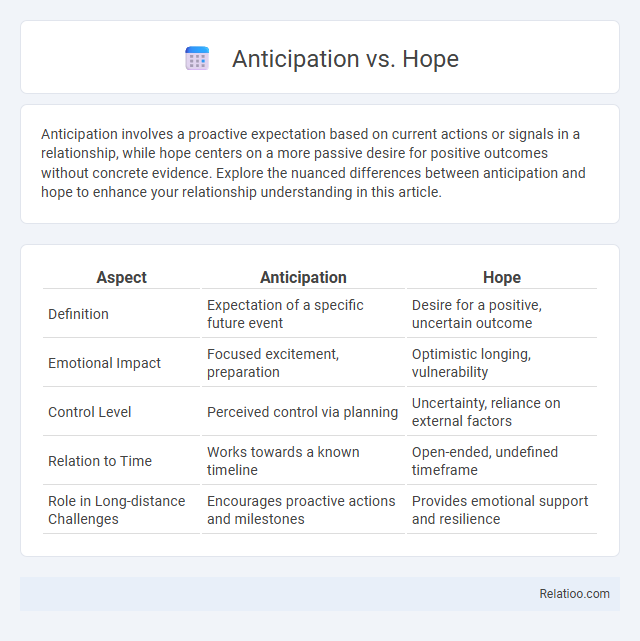Anticipation involves a proactive expectation based on current actions or signals in a relationship, while hope centers on a more passive desire for positive outcomes without concrete evidence. Explore the nuanced differences between anticipation and hope to enhance your relationship understanding in this article.
Table of Comparison
| Aspect | Anticipation | Hope |
|---|---|---|
| Definition | Expectation of a specific future event | Desire for a positive, uncertain outcome |
| Emotional Impact | Focused excitement, preparation | Optimistic longing, vulnerability |
| Control Level | Perceived control via planning | Uncertainty, reliance on external factors |
| Relation to Time | Works towards a known timeline | Open-ended, undefined timeframe |
| Role in Long-distance Challenges | Encourages proactive actions and milestones | Provides emotional support and resilience |
Defining Anticipation and Hope
Anticipation involves a forward-looking expectation based on probable outcomes, while hope centers on a desire for positive results despite uncertain circumstances. Understanding your emotional response helps differentiate anticipation's rational basis from hope's emotional motivation. Defining anticipation and hope clarifies how you approach future possibilities with varying degrees of certainty and optimism.
Psychological Foundations of Anticipation
Psychological foundations of anticipation involve the brain's ability to predict future events based on past experiences, activating neural circuits related to reward and motivation such as the dopaminergic pathways. Unlike hope, which is emotionally driven and idealizes positive outcomes, anticipation relies on cognitive processes that estimate probabilities and prepare adaptive responses. This anticipatory mechanism enhances decision-making and coping strategies by engaging prefrontal cortex regions responsible for expectation and planning.
The Nature of Hope: A Closer Look
The nature of hope lies in its forward-looking optimism, distinct from anticipation's specific expectation and anticipation's emotional preparation for future events. Hope embodies a broad, often uncertain desire for positive outcomes without guaranteed timelines or precise details. This intrinsic uncertainty differentiates hope as a flexible and resilient motivational state, fostering perseverance despite unpredictable circumstances.
Emotional Impact: Anticipation vs Hope
Anticipation triggers heightened emotional arousal by focusing on the certainty of an upcoming event, often intensifying excitement or anxiety depending on the expected outcome. Hope centers on positive expectations without guaranteed results, fostering resilience and optimism even amid uncertainty. The emotional impact of anticipation is usually immediate and visceral, while hope sustains longer-term motivation and emotional wellbeing.
Anticipation in Goal-Setting and Planning
Anticipation in goal-setting involves actively forecasting potential outcomes and challenges, enabling strategic adjustments that improve your plan's effectiveness. Unlike hope, which is passive and emotional, anticipation requires critical thinking and proactive behavior to prepare for success. Integrating anticipation into your planning process sharpens decision-making, maximizes resource allocation, and increases the likelihood of achieving goals efficiently.
Hope as a Coping Mechanism
Hope serves as a powerful coping mechanism by fostering positive expectations and psychological resilience in the face of uncertainty. Unlike anticipation, which is the cognitive process of looking forward to a specific event, hope involves an emotional investment that motivates perseverance despite challenges. This emotional optimism enhances mental health by reducing stress and promoting adaptive behaviors during difficult times.
Differences in Mindset and Expectations
Anticipation involves a proactive mindset centered on preparing for a specific future event, whereas hope reflects a more passive desire for a positive outcome without certainty. Expectation carries a stronger certainty and often sets a defined standard for how events should unfold, influencing emotional responses more rigidly than hope or anticipation. The key difference lies in how these mindsets manage uncertainty and emotional investment, with anticipation and expectation linked to action and readiness, while hope remains focused on possibility and optimism.
Cultural Perspectives on Anticipation and Hope
Cultural perspectives shape how anticipation and hope are experienced and expressed, with some societies viewing anticipation as a proactive mindset focused on preparation and control, while hope is often seen as a more passive, faith-based feeling tied to uncertainty and positivity. In collectivist cultures, anticipation may involve communal planning and collective optimism, contrasting with individualistic cultures where hope often centers on personal aspirations and resilience. Understanding these nuances enhances your ability to navigate and appreciate diverse emotional frameworks in global interactions.
Practical Applications in Daily Life
Anticipation involves preparing mentally and physically for a future event, enhancing productivity and reducing stress by enabling proactive planning. Hope drives emotional resilience and motivation during uncertain situations, fostering perseverance and positive Outlooks despite challenges. Both anticipation and hope contribute to effective decision-making and goal-setting, promoting a balanced approach to managing expectations and achieving personal and professional success.
Balancing Anticipation and Hope for Well-being
Balancing anticipation and hope plays a crucial role in promoting emotional well-being by managing expectations and reducing anxiety about future outcomes. Anticipation involves preparing for specific events, while hope maintains a positive outlook despite uncertainty, creating a dynamic interplay that supports mental resilience. Optimizing this balance allows individuals to stay motivated without becoming overwhelmed by unrealistic expectations or passive optimism.

Infographic: Anticipation vs Hope
 relatioo.com
relatioo.com